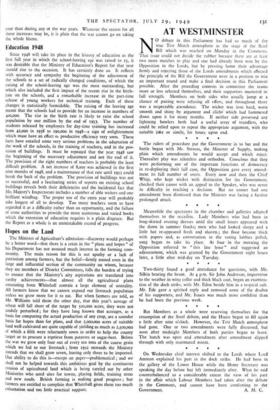Hopes on the Land
The Minister of Agriculture's admission—discovery would perhaps be a better word—that there is a crisis in the "plans and hopes" of his Department has not aroused much interest in the farming com- munity. The main reason for this is not apathy or a lack of patriotism among farmers, but the belief—firmly rooted even in the large and influential section of the community on whom, because they are members of District Committees, falls the burden of trying to ensure that the Ministry's airy aspirations are translated into earthy achievements—that almost all the agricultural plans emanating from Whitehall contain a large element of unreality. All farmers know that we cannot expand our livestock population unless we grow more for it to eat. But when farmers are told, as Mr. Williams told them the other day, that this year's acreage of wheat will fall short of the target by 500,000 acres, they were not unduly perturbed ; for they have long known that acreages, as a basis for computing the actual production of any crop, are a sounder basis for hopes than for plans, and that 2,000,000 acres of suitable land well cultivated are quite capable of yielding as much as 2,500,000 of which a fifth were reluctantly sown in order to help the county target or to procure a reprieve from potatoes or sugar-beet. Before the war we grew only four out of every ten tons of the coarse grain which we fed to our livestock ;. from 1952 onwards the Ministry intends that we shall grow seven, leaving only three to be imported. Our ability to do this is—except on paper—problematical ; and we shall not be helped towards this ambitious goal by the continuous erosion of agricultural land which is being carried out by other Ministries who need sites for towns, playing fields, training areas and new roads. British farming is making good progress ; but farmers are entitled to complain that Whitehall gives them too much exhortation and too little practical support.


































 Previous page
Previous page